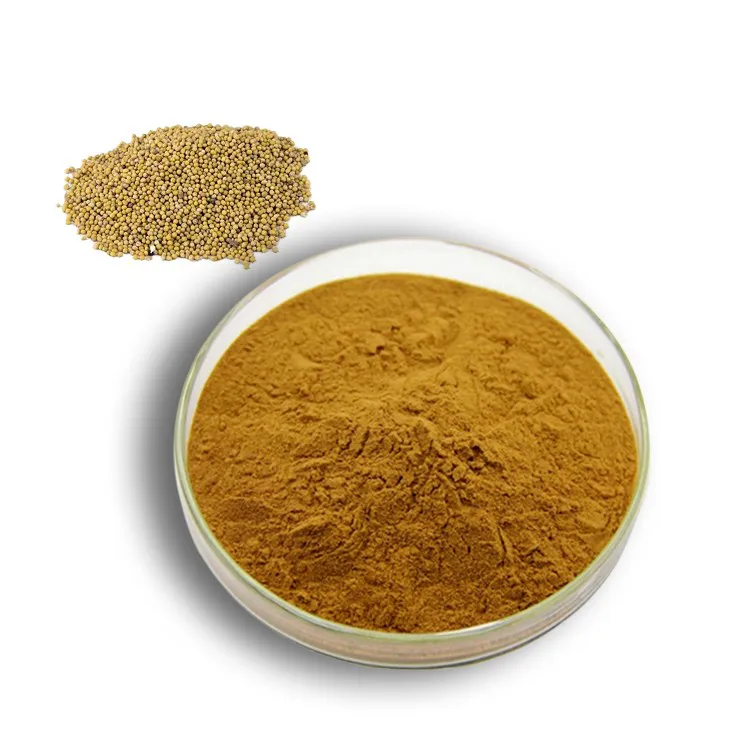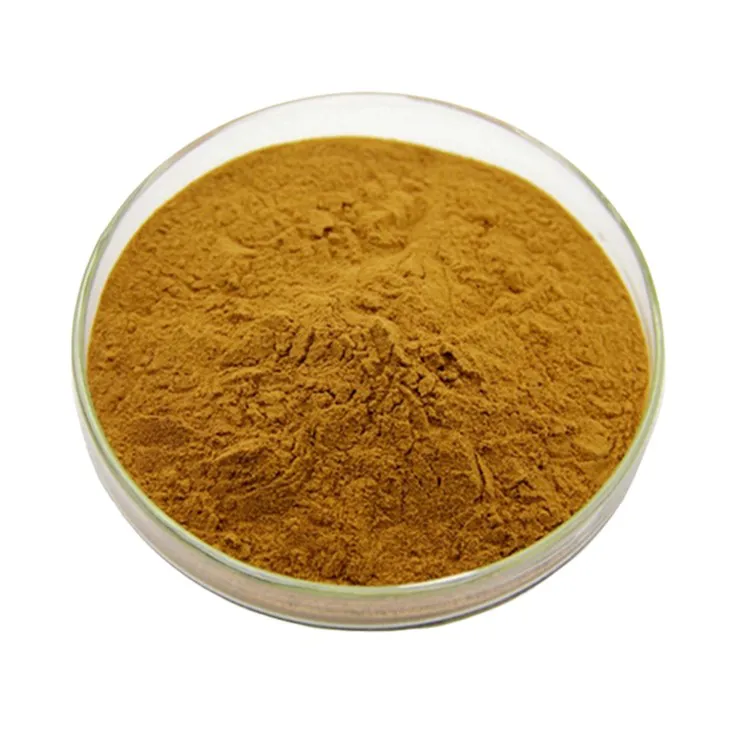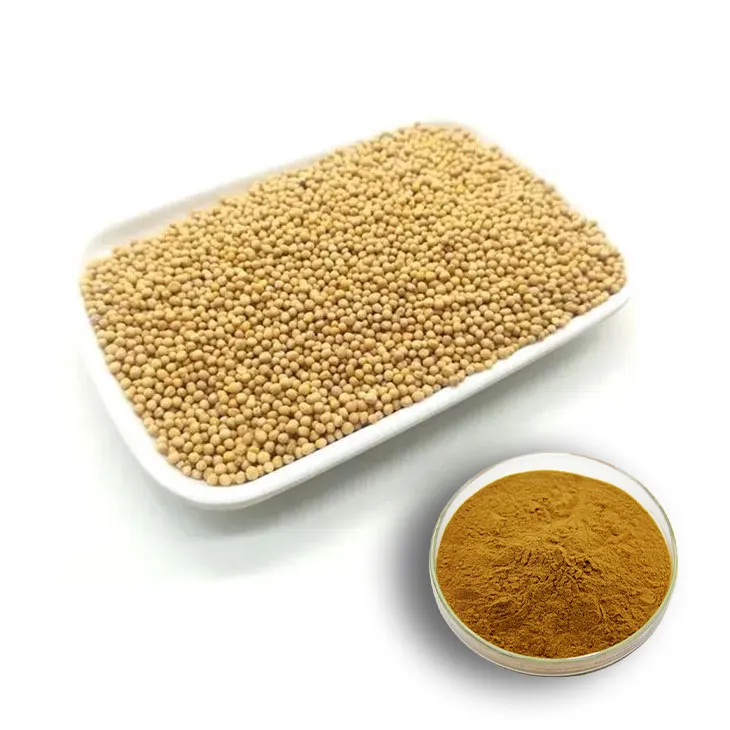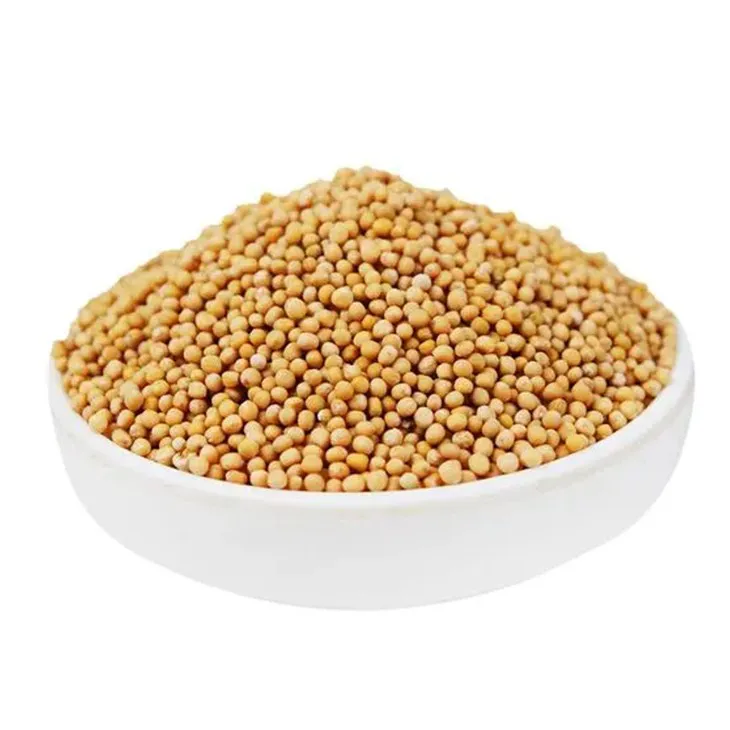- 0086-571-85302990
- sales@greenskybio.com
White mustard seed extract: Benefits, uses and possible side effects.
2024-11-14

1. Introduction
White mustard seed extract has been increasingly studied and recognized in different areas. It is obtained from the white mustard seeds, which have a long history of use in various cultures. This extract contains a complex mixture of substances that contribute to its diverse properties.

2. Nutritional Composition
White mustard seed extract is rich in several important nutrients. It contains proteins, which are essential for building and repairing tissues in the body. Additionally, it has vitamins such as vitamin C, which is important for the immune system and collagen synthesis. The extract also contains minerals like potassium, calcium, and magnesium. These minerals play crucial roles in maintaining proper physiological functions, such as nerve conduction, muscle contraction, and bone health.

3. Bioactive Compounds
One of the key aspects of White mustard seed extract is its abundance of bioactive compounds. Glucosinolates are among the most notable ones. These compounds are sulfur - containing substances that are characteristic of the mustard family. When the seeds are crushed or processed to obtain the extract, glucosinolates are released and can be enzymatically converted into other bioactive products, such as isothiocyanates. These isothiocyanates have been associated with various health - promoting effects.

4. Health Benefits
4.1 Anti - Inflammatory Properties
The anti - inflammatory properties of white mustard seed extract are of great significance. Inflammation is a natural response of the body to injury or infection, but chronic inflammation can lead to various diseases. The extract may help in reducing inflammation through several mechanisms. The bioactive compounds, particularly the isothiocyanates, can modulate the activity of certain inflammatory mediators in the body. For example, they may inhibit the production of cytokines, which are signaling molecules involved in the inflammatory process. This anti - inflammatory effect may potentially be beneficial for conditions such as arthritis, where joint inflammation causes pain and reduced mobility.
4.2 Antioxidant Activity
White mustard seed extract also exhibits antioxidant activity. Antioxidants are substances that can neutralize free radicals in the body. Free radicals are highly reactive molecules that can cause damage to cells, DNA, and proteins. By scavenging these free radicals, the extract can help protect the body from oxidative stress. Oxidative stress has been linked to numerous health problems, including aging, cancer, and cardiovascular diseases. The antioxidants in the extract, such as vitamin C and some of the bioactive compounds, can donate electrons to free radicals, thereby stabilizing them and preventing them from causing harm.
4.3 Potential Benefits for Digestive Health
The extract may have positive effects on digestive health. It can stimulate the production of digestive juices, which aids in the breakdown and absorption of food. Additionally, some of the compounds in the extract may have a prebiotic - like effect. Prebiotics are substances that can promote the growth of beneficial bacteria in the gut. A healthy gut microbiota is essential for proper digestion, immune function, and overall well - being. By promoting the growth of good bacteria, white mustard seed extract may contribute to a balanced gut environment.

5. Uses
5.1 In Traditional Medicine
White mustard seed extract has a long - standing use in traditional medicine. In the treatment of respiratory problems, it has been used for centuries. For coughs and bronchitis, it is often used in the form of poultices or inhalations. The warming and expectorant properties of the extract are believed to help relieve congestion in the airways, loosen mucus, and make coughing more productive. In some traditional systems, it is also used for treating minor skin ailments, as it may have anti - microbial properties on the skin surface.
5.2 In the Culinary World
White mustard seed extract is also used in the culinary world. It is a common ingredient in many condiments, such as mustard sauces. The extract adds a characteristic pungent flavor and aroma to these products. In cooking, it can be used to season meats, vegetables, and salads. It not only enhances the flavor but also provides some of the health benefits associated with the extract. For example, when added to a salad dressing, it can contribute to the antioxidant and anti - inflammatory properties of the overall meal.
5.3 In Cosmetics
The potential benefits of white mustard seed extract have led to its use in cosmetics. Due to its antioxidant and anti - inflammatory properties, it can be included in skincare products. It may help in reducing skin inflammation, protecting the skin from environmental damage, and promoting a more youthful appearance. Some cosmetic products use the extract in creams, lotions, and serums aimed at improving skin health and complexion.
6. Possible Side Effects
6.1 Skin Irritation
One of the possible side effects of white mustard seed extract is skin irritation. When the extract comes into direct contact with the skin, especially in individuals with sensitive skin, it can cause redness, itching, or a burning sensation. This is likely due to the presence of certain bioactive compounds that can be irritating to the skin. For example, some people may experience skin problems when using a mustard - based poultice on the skin for a long time without proper protection.
6.2 Allergic Reactions
Allergic reactions to white mustard seed extract are also a concern. Some individuals may be allergic to the proteins or other components in the extract. An allergic reaction can range from mild symptoms such as hives, swelling, and itching to more severe reactions like difficulty breathing and anaphylactic shock. People with known allergies to mustard or related plants should be especially cautious when exposed to white mustard seed extract.
6.3 Digestive Issues from Improper Consumption
Improper consumption of white mustard seed extract can lead to digestive issues. Consuming large amounts of the extract may cause stomach upset, nausea, vomiting, or diarrhea. This is because the bioactive compounds in the extract, if ingested in excessive quantities, can irritate the lining of the digestive tract. Additionally, if the extract is not properly processed or prepared, it may contain substances that are difficult for the body to digest, further contributing to digestive problems.
7. Precautions and Considerations
When using white mustard seed extract, certain precautions should be taken. First, it is important to do a patch test before applying it to the skin, especially if you have sensitive skin. This involves applying a small amount of the extract to a small area of the skin and waiting for 24 - 48 hours to see if any irritation occurs. For those with known allergies to mustard or related plants, it is best to avoid using the extract altogether.
In terms of consumption, it should be used in moderation. The recommended dosage should be followed, and if any digestive discomfort occurs after consumption, it is advisable to stop using it. Pregnant and breastfeeding women should also consult a healthcare provider before using white mustard seed extract, as there is limited research on its safety in these populations.
8. Conclusion
White mustard seed extract offers a range of potential benefits, from its anti - inflammatory and antioxidant properties to its uses in traditional medicine, culinary, and cosmetics. However, it also has possible side effects that need to be considered. By understanding these benefits and risks, individuals can make more informed decisions about whether and how to use white mustard seed extract in a way that is both safe and potentially beneficial for their health.
FAQ:
What are the main nutrients in white mustard seed extract?
White mustard seed extract is rich in various nutrients such as vitamins (like vitamin C and some B - vitamins), minerals (including calcium, magnesium, and potassium), and it also contains bioactive compounds. These nutrients contribute to its potential health - promoting effects.
How does white mustard seed extract help with respiratory problems?
The exact mechanism is not fully understood. However, it is believed that the bioactive compounds in white mustard seed extract may have properties that can soothe the airways, reduce irritation, and potentially help with the symptoms of respiratory problems like coughs and bronchitis. In traditional medicine, it has been used for such purposes for a long time.
Can white mustard seed extract be used topically?
While it has potential benefits, caution should be exercised when using it topically. Due to the possibility of skin irritation or allergic reactions in some people, it is not recommended for widespread or untested topical use. If used, it should be done under the guidance of a healthcare professional.
What digestive issues can be caused by improper consumption of white mustard seed extract?
Improper consumption of white mustard seed extract may lead to problems such as stomach upset, nausea, or diarrhea. This could be due to the strong bioactive compounds it contains which may be irritating to the digestive tract if consumed in excessive amounts or in the wrong way.
How can one determine if they are allergic to white mustard seed extract?
If a person experiences symptoms such as skin redness, itching, swelling, or respiratory distress (such as shortness of breath or wheezing) after coming into contact with white mustard seed extract, it could be an indication of an allergy. A medical test can also be done to confirm an allergy.
Related literature
- The Nutritional and Therapeutic Properties of Mustard Seeds"
- "Bioactive Compounds in White Mustard Seed Extract: A Comprehensive Review"
- "White Mustard Seed Extract in Traditional and Modern Medicine"
- ▶ Hesperidin
- ▶ Citrus Bioflavonoids
- ▶ Plant Extract
- ▶ lycopene
- ▶ Diosmin
- ▶ Grape seed extract
- ▶ Sea buckthorn Juice Powder
- ▶ Fruit Juice Powder
- ▶ Hops Extract
- ▶ Artichoke Extract
- ▶ Mushroom extract
- ▶ Astaxanthin
- ▶ Green Tea Extract
- ▶ Curcumin
- ▶ Horse Chestnut Extract
- ▶ Other Product
- ▶ Boswellia Serrata Extract
- ▶ Resveratrol
- ▶ Marigold Extract
- ▶ Grape Leaf Extract
- ▶ New Product
- ▶ Aminolevulinic acid
- ▶ Cranberry Extract
- ▶ Red Yeast Rice
- ▶ Red Wine Extract
-
Citrus Aurantii Extract
2024-11-14
-
Epimedium extract powder
2024-11-14
-
Beetroot Powder
2024-11-14
-
Cassia Seed Extract
2024-11-14
-
Berberis aristata Extract
2024-11-14
-
Grape Seed Extract
2024-11-14
-
Marigold Extract
2024-11-14
-
Gynostemma pentaphyllum extract
2024-11-14
-
Aguaje Extract
2024-11-14
-
Genistein
2024-11-14





















